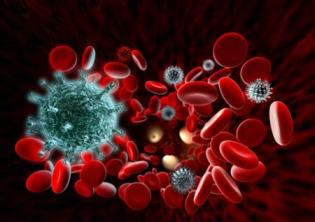White blood cells important for yo-yo effect after weight loss
Adipose tissue in the body may increase the likelihood of gaining weight after weight loss. The cells of the immune system, also known as white blood cells, play an important role as well. These were the results of a study conducted by Edwin Mariman, professor of Functional Genetics at Maastricht University. Mariman published his findings in the leading scientific journal American Journal of Clinical Nutrition.
Yo-yo effect
Up to 80% of people who follow a strict weight loss diet end up regaining weight. Many of these people return to their starting weight within one or two years. The underlying causes of this yo-yo effect were previously ascribed to factors like lifestyle and living conditions. In addition to psychosocial factors, adipose tissue also increases the chance of future weight gain. Mariman's team examined the adipose tissue of people who gained weight after weight loss. An analysis of this tissue revealed that immune cells, more commonly known as white blood cells, also play a significant role.
White blood cells
We have known for some time now that white blood cells, or leukocytes, penetrate adipose tissue and make it more aggressive in people who are overweight. After weight loss, these leukocytes should become less active, and they do in some people. But in others, the leukocytes remain extremely active in the adipose tissue, as the Maastricht research team discovered. These people have a considerably higher risk of gaining weight in the future. ‘Follow-up research should reveal how this mechanism works,' says Mariman.
Stress in fat cells
Mariman suspects he knows why the predictive value of white blood cells can lead to weight gain. 'Fat cells play an important role in weight loss and weight gain. Fat cells release more than 500 different protein hormones. One of these important proteins is leptin, which supresses appetite and is also involved in inflammatory response. When someone loses weight, fat cells shrink and leptin levels decrease. Shrinking fat cells paired with a disrupted energy balance causes stress within the fat cells. The body may mistake this stress response for inflammation,' says Professor Mariman. 'That could explain why some people have increased white blood cell activity in adipose tissue after weight loss. This insight may help to minimise inflammatory response, thereby helping people control the yo-yo effect and maintain their goal weight.'
Also read
-
In honour of the presentation of the VNVA Els Borst Prize for her oeuvre, Prof Marlies Bongers is organising the symposium "menstruation in RED on the agenda" on 1 October.
-
In women trying to conceive, 1-3% experience repeated miscarriages. For more than 50% of these women, a cause for the miscarriages has yet to be found. New research from Maastricht University (UM) and the Maastricht University Medical Centre+ (MUMC+) shows that the immune system’s Natural Killer (NK...
-
The European Commission has awarded €23 million to set up a new platform for drug repurposing: the use of existing drugs in diseases other than those for which they were originally developed. In the next seven years UM will develop the platform REPO4EU (precision drug REPurpOsing for Europe)...



